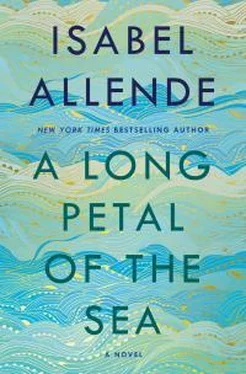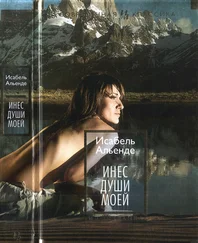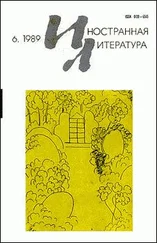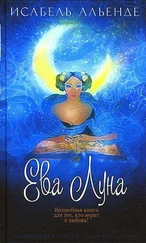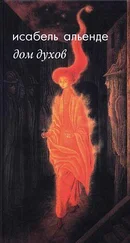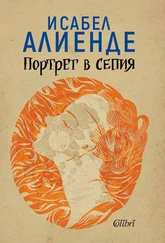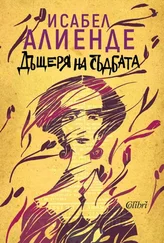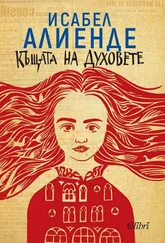Isidro del Solar’s estate wasn’t expropriated, but was taken over by the peasant farmers. He regarded it as having been lost temporarily, because, as he told everyone, decency and morality would be restored sooner or later, and concentrated on saving his wool export business before the rabble ate his animals. He hired huasos from the south who knew the paths and shortcuts through the Andes, and sent his sheep to Argentine Patagonia, as other ranchers did with their cattle. Also, he transferred his family to Buenos Aires. They left en masse, including the married daughters, their husbands, and the grandchildren with their nannies. Juana Nancucheo stayed behind to look after the Calle Mar del Plata house. Laura had to be dragged along, stupefied with tranquilizers and sweets, after she was promised that in her absence Felipe would make sure there were always fresh flowers on Leonardo’s grave. Felipe was the only one of the family who stayed; he carried on working at his legal practice, although the other two lawyers left to open a branch in Montevideo.
In those days he would often pay a visit to the Dalmaus in their house in the traditional Nuñoa district, where nobody from his own class lived. He dropped in with a couple of bottles of wine and a desire to talk. He no longer felt at ease with his lifelong friends, but couldn’t fit in with his few acquaintances on the Left either. They reproached him about his affected manners copied from the English, as well as the vagueness of his political position. The Club of the Enraged had long ago dissolved. He dedicated himself to acquiring, at knockdown prices, antiquities and works of art from families who were leaving the country in a hurry, until before long he had no room to move about in his house. He began looking for a larger one, taking advantage of the fact that property was well-nigh being given away. He laughed at himself, recalling how in his youth he had criticized the extravagance of his parents’ home. When Roser asked him what he would do with all his trinkets if, as he often said, he decided to leave the country, he replied that he would store them in a warehouse until his return, because Chile wasn’t Russia or Cuba, and the famous Chilean-style revolution wasn’t going to last very long. He seemed so certain of this that Victor suspected his friend was in the know about some fundamental intrigue. Just in case, he never mentioned his games of chess with the president.
Whenever Felipe drank whisky to follow the wine over dinner, his tongue was loosened, and he started railing against life and the world in general. He had become cynical, with little left of his youthful idealism and generosity. He admitted that socialism was the most just system, but in practice it led to a police state or a dictatorship as in Cuba, where anybody who didn’t agree with the regime either escaped to Miami or ended up in prison. His aristocratic nature abhorred the disorder of equality, revolutionary clichés, dogmatic slogans, vulgar manners, bushy beards, and the ugly handicrafts: cane furniture and jute carpets, rope sandals, seed necklaces, crocheted skirts. It was all a huge disaster. “I don’t see why we should dress like beggars,” he maintained. Not to mention what was called popular culture, which had nothing cultural about it. It was a Chilean version of the Soviets’ horrible socialist realism, with their murals of miners raising their fists and Che Guevara portraits, singer-songwriters preaching sermons with their tedious little tunes. “Even instruments like the Mapuche trutruca and the quena of the Quechuas have become fashionable!”
However, when Felipe was with his usual right-wing friends, he would subject them to an equally devastating critique of the recalcitrant, conspiratorial upper classes who were stuck in the past and remained blind and deaf to the people’s demands, only too ready to defend their privileges at the cost of democracy and of their country. They were traitors. In short, nobody could stomach him, and he became increasingly isolated. His bachelor’s solitude weighed heavily on him, and he was full of aches and pains.
Victor, who had been so pleased with the improvements in public health, from the daily glass of milk for every child as a palliative against malnutrition to the building of new hospitals, found he had no antibiotics, anesthetics, needles, syringes, or basic medicines. There was also a shortage of people to care for the sick, because many doctors had left Chile to ride out the feared Soviet tyranny that the opposition propaganda was predicting, and because the School of Medicine had declared a strike, which most of his colleagues joined. He continued working double shifts, falling asleep on his feet, weary to the core, and feeling as though he had lived through the same thing during the Spanish Civil War. Other professional associations, factory owners, and business organizations also imposed a shutdown. When truck drivers refused to work, the long, thin country was left without transport. Fish rotted in the north, vegetables and fruit in the south, while in Santiago there were shortages of essentials. Allende roundly denounced North American intervention in their financing of the truck drivers and right-wing conspiracies. Students added to the chaos, barricading themselves in university lecture halls. When they blockaded the faculty entrance with sandbags, Roser arranged to see her students in the park and gave her theory classes in the open air, under umbrellas if necessary. She took attendance and gave grades as usual, only sad that she couldn’t drag a grand piano out there. People grew accustomed to the sight of the police in riot gear, protest placards and banners, inflammatory posters, the threats and catastrophic warnings in the press, the shouts from one side and the other, everyone against everyone. And yet there was unanimous consensus over the complete nationalization of mining.
“It was about time,” Marcel Dalmau told his grandmother. “Copper is Chile’s paycheck, it’s what sustains the economy.”
“If copper is Chilean, I don’t see why it has to be nationalized.”
“It’s always been in the hands of North American companies, Àvia . The government took it back and refused to indemnify the Americans, because they owe the country billions of dollars in excessive profits and tax evasion.”
“The Americans aren’t going to like that. Take heed of what I’m saying, Marcel, there’s going to be trouble,” Carme told him.
“When the Americans leave the mining industry, we’re going to need more Chilean engineers and geologists. I’m going to be in demand, Àvia.”
“I’m glad. Will they pay you more?”
“I don’t know. Why?”
“So that you can get married, Marcel. If you don’t hurry up, I’m not going to get to know my great-grandchildren. You’re thirty-one, it’s time for you to settle down.”
“I am settled.”
“I can’t see any women in your life. That’s not normal. Have you never been in love? Or are you one of those who…? Well, you know what I mean.”
“How nosy you are, Àvia !”
“This comes from the vice of riding a bicycle. It crushes the testicles and causes impotence and sterility.”
“Aha.”
“I read it in a magazine at the hairdresser’s. And it’s not that you’re bad-looking, Marcel. If you got rid of that beard and cut that mop of hair of yours, you’d look just like Dominguin.”
“Who?”
“The bullfighter, of course. And you’re not stupid either. Wake up a bit. You’re like a Trappist monk.”
Carme hadn’t anticipated that one consequence of the nationalization would be that the copper corporation gave her grandson a grant to go to the United States. She got it into her head she would never see him again. Marcel left for Colorado, to a city at the foot of the Rocky Mountains founded during the gold rush, to study geology. He took his dismantled bike with him because it was specially made for him, together with his Victor Jara records. “I’ll write to you,” was the last thing Àvia told him in the airport.
Читать дальше
